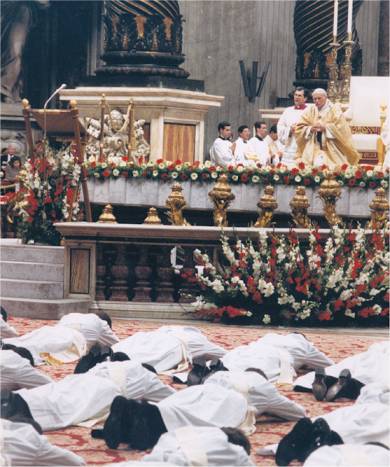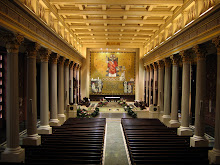Over the last two days, I have been part of two great celebrations. Last night, I had the privilege to officiate at the wedding of two friends of mine: Angela and Ryan. They are a young couple that I could see really love each other. The ceremony had some of the best music that I have heard at a wedding in a long time. It is uplifting as a priest to celebrate a wonderful event in their lives and to see their joy at coming together as one in Christ.
Today, as the Church celebrates the Feast of Christ the King, Regnum Christi celebrates their Patronal Feast. I have many friends from my two parish assignments who are part of the movement and are really on fire with the Spirit and a love for the Lord. The celebration was held here at our Cathedral and had about 250 gathered. The movement is lay driven and is about the faithful living their faith in a strong and dynamic way. There have been many fruits from the movement that I have seen, including numerous vocations to the priesthood and religious life. (I only hope for more vocations to the Diocesan priesthood!)
As Vocation Director for priests in the Archdiocese, I could only wish for more such movements that help the faithful live their call as Baptized Christian, because when the faithful take their call to holiness seriously, all vocations flourish.
God Bless!
Sunday, November 26, 2006
Saturday, November 25, 2006
Heaven and Hell
Thought I would share a response to a question about Haven and Hell:
In regard to receiving differing levels of punishment or reward in Hell or Heaven, respectively, that was certainly the vision of Dante in his Divine Comedy. He broke Heaven, Hell and Purgatory into nine levels each. Dante’s visions would most likely be the most developed, even today, of the vision of heaven and hell as you describe.
As far as official Church teaching, the best place to start a quest for answers would be in the Catechism of the Catholic Church, specifically paragraphs 1020-1060. (The Catechism is organized, like nearly all Church documents, by paragraph due to the multitudes of translations needed for worldwide distribution and use.)
The most pertinent of ideas for your questions are that each person goes through a particular judgment at the moment of their death. The question that must be answered is how that person has responded to the particular graces that God has offered to him or her during life. If the person had a complete response to these graces, they will be ushered in to the Kingdom of Heaven. (The Church’s teaching would say that this was only done by one person beside Christ, Mary.) If the person had a life of responding to the graces that God offered, but yet not in a perfect way, they would undergo a period of purification to be able to join in the wonderful Kingdom of Heaven, hence Purgatory. It can be summed up rather crudely by saying that you are on the way to heaven, but you have to be cleaned up a bit first.) Lastly, if the person did not respond whatsoever to the graces that God offered during life, their pattern of life would be such that they could not accept that grace after death, and then would be banished outside of the Kingdom of Heaven, hence Hell.
One last thing to keep in mind, Hell is not an absence of God. It is the realization that I have lived my life as if there were, and now I am forced to come to grips with that as a mistake in life.
In either heaven or hell would an individual receive differing amounts of
reward/punishment depending on how that individual lived his/her life? For
example, someone who committed countless atrocities vs. someone who committed
the minimal amount of sins to go to hell – would one receive more punishment
than the other? Also, do you feel one hundred percent justified in knowing the
true nature of the good life (the life God wants you to live)? (I have a hunch
that you wouldn’t because that would be tantamount to knowing the mind of God).
Lastly, could you comment on the view of any other religious denominations
concerning these topics (even general accounts)?
In regard to receiving differing levels of punishment or reward in Hell or Heaven, respectively, that was certainly the vision of Dante in his Divine Comedy. He broke Heaven, Hell and Purgatory into nine levels each. Dante’s visions would most likely be the most developed, even today, of the vision of heaven and hell as you describe.
As far as official Church teaching, the best place to start a quest for answers would be in the Catechism of the Catholic Church, specifically paragraphs 1020-1060. (The Catechism is organized, like nearly all Church documents, by paragraph due to the multitudes of translations needed for worldwide distribution and use.)
The most pertinent of ideas for your questions are that each person goes through a particular judgment at the moment of their death. The question that must be answered is how that person has responded to the particular graces that God has offered to him or her during life. If the person had a complete response to these graces, they will be ushered in to the Kingdom of Heaven. (The Church’s teaching would say that this was only done by one person beside Christ, Mary.) If the person had a life of responding to the graces that God offered, but yet not in a perfect way, they would undergo a period of purification to be able to join in the wonderful Kingdom of Heaven, hence Purgatory. It can be summed up rather crudely by saying that you are on the way to heaven, but you have to be cleaned up a bit first.) Lastly, if the person did not respond whatsoever to the graces that God offered during life, their pattern of life would be such that they could not accept that grace after death, and then would be banished outside of the Kingdom of Heaven, hence Hell.
One last thing to keep in mind, Hell is not an absence of God. It is the realization that I have lived my life as if there were, and now I am forced to come to grips with that as a mistake in life.
Friday, November 24, 2006
Celibacy misunderstood
Fr. Donald Cozzens just does not get it. As he once again takes a minimalist view of the gift of celibacy, his agenda shines forth loud and clear. He speaks of many priests who are frustrated by living a single life and how everything would be grand if priests could get married.
I don't think so.
The question of optional celibacy of priests brings up many issues that would have to be addressed:
- wages: priests make enough for us to live comfortably, but raising a family would be tough on our salary.
- pressures on wife: what role would she be expected to have in the life of a parish.
- children: the scrutiny that they would be under
- freedom: celibacy for priests is about a freedom to serve God's people completely, as a married priest I would feel torn in two by my obligations to the parish and to the family.
- priest as 'Pastor': as pastor, the priest is the head of the family of the parish, leading them all (hopefully) closer to God the Father, who is the model of the priest's fatherhood.
There are many other issues that would need to be adequately examined before the rule on celibacy could be relaxed. And I keep falling back that if married clergy were an absolute success in Protestant communities, it would help. But it is not. The rate of divorce among Protestant married clergy is high, because the non-clergy member of the union (husband or wife) feels second class or does not want to put up with the stress that comes with the territory. I've heard: I married you, not the church you work for.
If the priesthood were a job, maybe. But as it is, the priesthood is a way of life and a vocation, a calling by God to something more. Only those who embrace this completely can transcend the ho-hum operation of a parish to flourish as the spiritual father of his own slice of the world.
I don't think so.
The question of optional celibacy of priests brings up many issues that would have to be addressed:
- wages: priests make enough for us to live comfortably, but raising a family would be tough on our salary.
- pressures on wife: what role would she be expected to have in the life of a parish.
- children: the scrutiny that they would be under
- freedom: celibacy for priests is about a freedom to serve God's people completely, as a married priest I would feel torn in two by my obligations to the parish and to the family.
- priest as 'Pastor': as pastor, the priest is the head of the family of the parish, leading them all (hopefully) closer to God the Father, who is the model of the priest's fatherhood.
There are many other issues that would need to be adequately examined before the rule on celibacy could be relaxed. And I keep falling back that if married clergy were an absolute success in Protestant communities, it would help. But it is not. The rate of divorce among Protestant married clergy is high, because the non-clergy member of the union (husband or wife) feels second class or does not want to put up with the stress that comes with the territory. I've heard: I married you, not the church you work for.
If the priesthood were a job, maybe. But as it is, the priesthood is a way of life and a vocation, a calling by God to something more. Only those who embrace this completely can transcend the ho-hum operation of a parish to flourish as the spiritual father of his own slice of the world.
Labels:
celibacy,
priesthood,
vocation
Thanksgiving
As we celebrate this American holiday, a tribute to eating too much and beginning the holiday shoppeing season, I keep thinking back to what the Archbishop said at the Ohio Young Adult Conference this past weekend: 'It is always appropriate to show gratitude.' As a culture, I do not think that we say "Thanks" enough. I know that I have received many good gifts in my life, and I often take them for granted. I have a wonderful family that I do not see often enough, my parents were excellent in raising me, not perfect, but I knew I was loved. As a priest, I am supported by the generosity of people I do not know, so that I can do the things I need to do. I am also aware of the gifts God has given me, from my vocation to my joy in working with people. As we gather to celebrate with friends and family, always remember to say thanks. It costs very little to give, but can give us the world in return.
May God bless you as we prepare to once again welcome His Son into the world.
May God bless you as we prepare to once again welcome His Son into the world.
Thursday, November 23, 2006
Here we go!
I have finally jumped in with the whole blog thing. I am not sure what I will be adding or talking about yet at this point, but I want to use this to help in my work as Vocation Director for the Archdiocese of Cincinnati. I've got a few ideas so far, so if nothing else, let's have some fun!
Subscribe to:
Posts (Atom)








